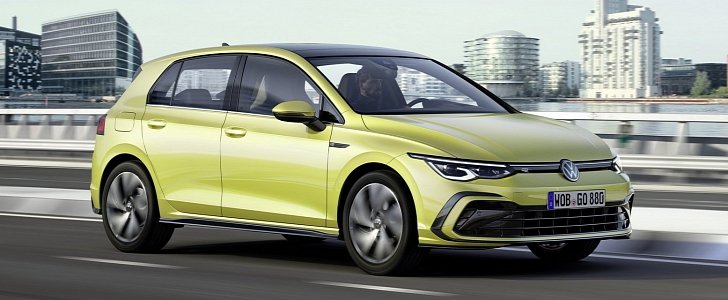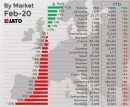JATO Dynamics has collected and released all the car sales data for the European market, and it's not looking got in February. Even before the virus hit hard and social distancing was a big thing, the market slipped 7% lower compared to last year.
1,063,264 represents the lowest number of registrations since 2015 and falls in line with January's decline of 7.6%. The numbers aren't too bad right now, but we're probably overdue for a recession, thanks to the one-two punch of economic and car production slowdowns.
Despite this, electrified car deliveries witnessed a substantial 80% jump to 135,500 units last month. We're finally seeing a positive response from the buyers, as they now represent 13% of the total market. However, we're not talking about just EVs here, as hybrids like the Toyota Corolla, C-HR, Yaris and RAV4 are at the top of the list. Meanwhile, the best performing fully electric model in Europe is still the Renault Zoe (6,391 units), followed by the venerable e-Golf (3,695 units).
Speaking of those two brands, the Golf slipped -21% compared to February 2019, allowing the Renault Clio to claim the No.1 sales spot. It could be just a temporary switch, but perhaps equally interesting is what happens further down in the list. Two new sister cars, the Peugeot 208 and Opel Corsa are now breathing down the Clio's back. And in No.5, we have an ancient city car we dislike, the Fiat Panda. It's cheap, frugal and very popular in the Mediterranean.
"The situation is rapidly deteriorating in Europe due to complex regulation, lack of available homologated cars, and increasing pressure on the economy. All of these factors are having a detrimental impact on consumer confidence," says Felipe Munoz, global analyst at JATO Dynamics.
The so-called D- or midsize-segment registered the strongest growth, thanks not to the Tesla Model 3, which actually slipped little, but to the launch of a new BMW 3 Series and the VW Passat facelift. However, so-called SUVs still account for the largest portion of European registrations. The segment was stable, thanks to new arrivals like the VW T-Cross, Ford Puma and Skoda Kamiq.
Despite this, electrified car deliveries witnessed a substantial 80% jump to 135,500 units last month. We're finally seeing a positive response from the buyers, as they now represent 13% of the total market. However, we're not talking about just EVs here, as hybrids like the Toyota Corolla, C-HR, Yaris and RAV4 are at the top of the list. Meanwhile, the best performing fully electric model in Europe is still the Renault Zoe (6,391 units), followed by the venerable e-Golf (3,695 units).
Speaking of those two brands, the Golf slipped -21% compared to February 2019, allowing the Renault Clio to claim the No.1 sales spot. It could be just a temporary switch, but perhaps equally interesting is what happens further down in the list. Two new sister cars, the Peugeot 208 and Opel Corsa are now breathing down the Clio's back. And in No.5, we have an ancient city car we dislike, the Fiat Panda. It's cheap, frugal and very popular in the Mediterranean.
"The situation is rapidly deteriorating in Europe due to complex regulation, lack of available homologated cars, and increasing pressure on the economy. All of these factors are having a detrimental impact on consumer confidence," says Felipe Munoz, global analyst at JATO Dynamics.
The so-called D- or midsize-segment registered the strongest growth, thanks not to the Tesla Model 3, which actually slipped little, but to the launch of a new BMW 3 Series and the VW Passat facelift. However, so-called SUVs still account for the largest portion of European registrations. The segment was stable, thanks to new arrivals like the VW T-Cross, Ford Puma and Skoda Kamiq.




